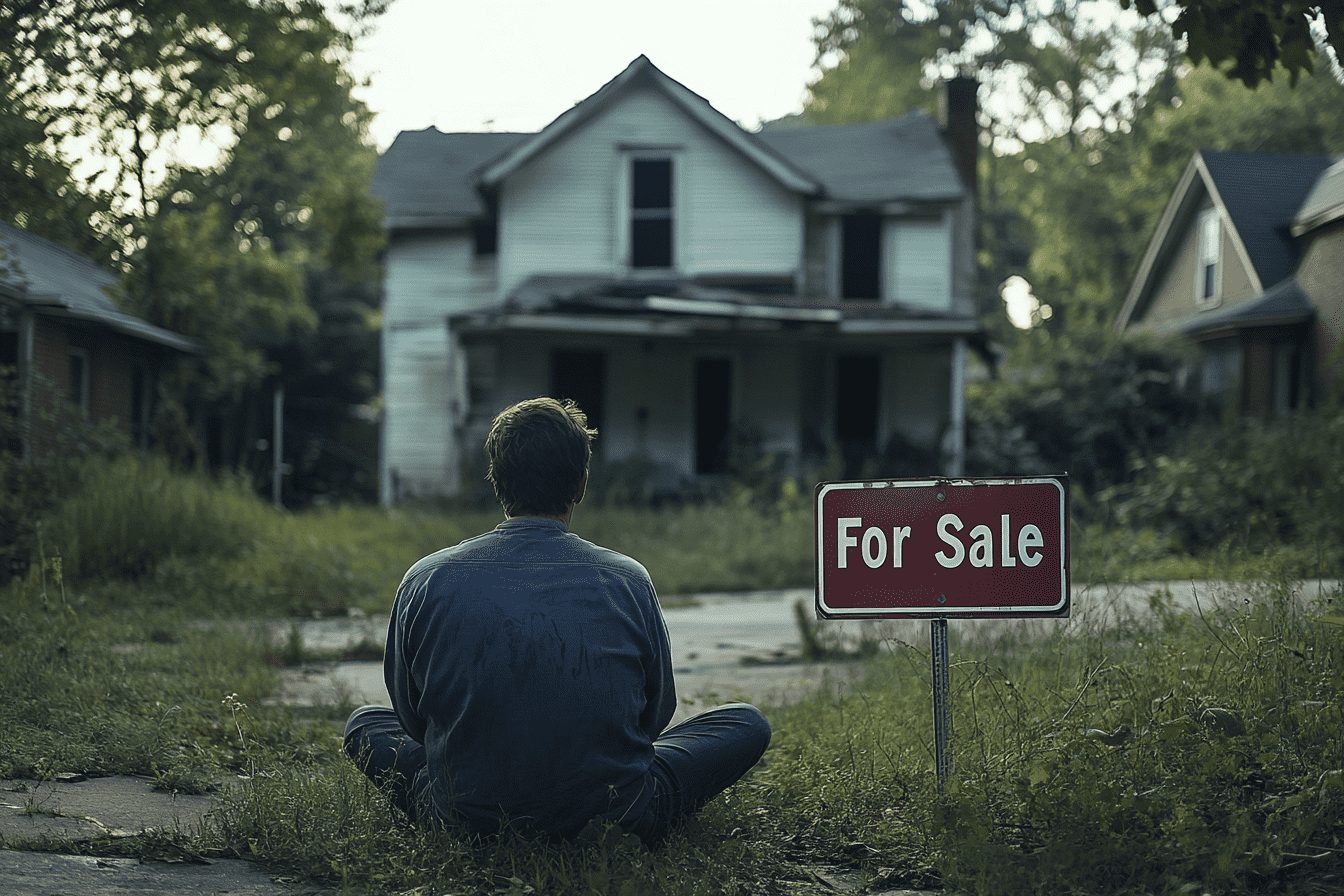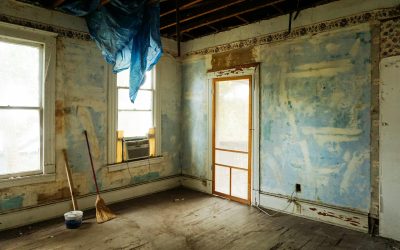Has your home been sitting on the market for weeks? Are you wondering why buyers aren’t showing interest? The frustrating question looms: “Why won’t my house sell?”
Most homes that linger on the market face financial challenges rather than property issues. These roadblocks often prevent quick sales and reduce buyer interest.
As of May 2025, homes in the United States stayed on the market for 38 days. This represents a slight increase from previous years. Current mortgage rates around 6.8-7% continue to impact buyer behavior and market dynamics.
These market changes stem from several factors. Higher interest rates affect buyer purchasing power. Limited inventory creates competition among available properties. Shifting buyer preferences also influence market activity.
This article examines 22 common reasons homes fail to sell quickly. You’ll discover practical solutions to address each challenge. These strategies help turn stagnant listings into successful sales.
Understanding why properties don’t sell helps sellers take action. Most issues have straightforward fixes once identified. Quick adjustments often lead to renewed buyer interest and competitive offers.
The current market demands strategic thinking from sellers. Properties that stand out attract more attention. Smart pricing and presentation create buyer urgency and faster sales.

Common Reasons Your Home Won’t Sell
The real estate market involves many moving parts that affect property sales. Problems can stem from pricing issues, market conditions, property defects, poor marketing, or inexperienced agents.
Outside factors also matter significantly. Economic trends, mortgage rates, and seasonal changes all impact buyer behavior. Understanding these elements helps you identify and fix selling obstacles.
Here are 22 key reasons your home stays on the market:
1. Your Home Costs Too Much
Pricing your home above market value immediately eliminates many potential buyers. Most buyers research comparable properties before viewing homes. They know what similar houses cost in your area.
Research recent sales in your neighborhood to determine fair market value. Look for homes with similar square footage, bedrooms, and bathrooms. These comparable sales show what buyers actually pay for properties like yours.
Ask your real estate agent for their professional pricing opinion. They have access to detailed market data and understand current buyer preferences. Their expertise helps you set competitive prices.
Lower your price if research shows you’re asking too much. Bringing your price in line with neighborhood standards attracts more buyers. A well-priced home generates multiple showings and competitive offers quickly.
2. The Market Is Slow and Buyers Aren’t Active
The US housing market is experiencing significant slowdowns, with May 2025 posting the slowest home sales in 16 years. Many economists now predict home prices will decline 1-1.4% by the end of 2025. This cooling market directly affects how quickly homes sell.
Slow markets mean fewer active buyers and longer selling times. Properties sit on the market longer, even at fair prices. This situation often lies beyond your immediate control.
You still have several options to attract buyers in slow markets. Lower your listing price to compete more effectively with other sellers. Offer buyer incentives like closing cost assistance or home warranties.
Consider flexible closing dates to accommodate buyer needs. Some sellers rent their homes temporarily until market conditions improve. This strategy provides income while waiting for better selling opportunities.
3. Your Home Needs Significant Repairs
Buyers avoid properties requiring major repairs unless specifically seeking fixer-uppers. Visible problems immediately discourage potential purchasers during showings. Most buyers want move-in ready homes.
Fix major issues before listing your property for sale. Address leaks, structural cracks, and wall damage promptly. These problems signal potential expensive repairs to buyers.
Consider cosmetic improvements that enhance visual appeal significantly. Fresh paint updates rooms and makes spaces feel cleaner. Updated fixtures modernize outdated appearances without major expense.
These improvements make your home more appealing to buyers. Well-maintained properties sell faster and often command higher prices. Small investments in repairs frequently pay off substantially.
4. Your Home Lacks Proper Staging
Poor staging prevents buyers from visualizing themselves living in your space. Cluttered or messy rooms make properties feel smaller and less appealing. Buyers struggle to see a home’s true potential through personal belongings.
Declutter every room thoroughly before listing your property for sale. Remove excess furniture, personal photos, and unnecessary items from all surfaces. Deep clean your home to create fresh, welcoming spaces.
Consider hiring professional stagers who understand buyer psychology effectively. They arrange furniture and décor to highlight your home’s best features. Professional staging creates inviting atmospheres that appeal to target buyers.
Properly staged homes sell faster and often receive higher offers. The investment in staging frequently pays for itself through quicker sales. Well-presented properties stand out significantly in competitive markets.
5. Your Photos Look Unprofessional
Most buyers begin their home search online before scheduling any showings. Poor quality photos immediately eliminate your property from consideration. Dark, blurry, or awkwardly angled images turn buyers away instantly.
Professional photography showcases your home’s best features effectively and attractively. High-quality images make spaces look bright, spacious, and inviting to viewers. Professional photographers understand lighting and angles that flatter properties.
Good photos generate more online views and showing requests significantly. They create positive first impressions that encourage buyers to visit. Quality images often determine whether buyers consider your property seriously.
Invest in professional photography to maximize your home’s online appeal. This relatively small expense can dramatically increase buyer interest. Great photos are essential marketing tools in today’s digital marketplace.
6. Your Home Sits in an Undesirable Location
Location problems often lie beyond your control as a homeowner. Bad neighborhoods, busy roads, or poor school districts discourage many buyers. These factors significantly impact selling speed and final prices.
Focus on maintaining your home exceptionally well despite location challenges. Well-maintained properties stand out positively among neglected neighborhood homes. Superior upkeep demonstrates pride of ownership to potential buyers.
Highlight every positive location aspect in your marketing materials actively. Emphasize proximity to good schools, parks, shopping centers, or transportation. Point out convenient commute times or recreational opportunities nearby.
Price your home competitively to offset location disadvantages effectively. Buyers often accept less desirable locations for significant savings. Strategic pricing can attract buyers seeking value over perfect locations.
7. Your House Lacks Attractive Curb Appeal
First impressions form immediately when buyers arrive at your property. Poor exterior appearance discourages buyers before they enter your home. Neglected yards and dirty exteriors signal potential maintenance problems inside.
Start improving curb appeal by cleaning up your yard completely. Remove dead plants, weeds, and debris from all visible areas. Trim grass, bushes, and trees to create neat, well-maintained appearances.
Add colorful potted plants or flowers near your entrance strategically. These inexpensive additions create welcoming, vibrant first impressions for visitors. Fresh plantings suggest well-cared-for properties throughout.
Clean your home’s exterior thoroughly before any showings begin. Wash windows, doors, and siding to remove dirt and grime. Pressure washing can dramatically improve older exteriors quickly and affordably.
8. Your Home Features Outdated Design Elements
Outdated styles immediately trigger renovation concerns in buyers’ minds. They envision expensive updates, lengthy projects, and construction disruptions. These thoughts often eliminate your property from serious consideration.
Update fixtures and hardware throughout your home for immediate modernization. Replace old door handles, light fixtures, and cabinet hardware affordably. These small changes create significant visual improvements quickly.
Consider painting walls in current, neutral colors that appeal broadly. Fresh paint updates any space dramatically without major expense. Choose colors that make rooms feel larger and brighter.
Flooring updates require more investment but transform spaces completely effectively. New flooring modernizes outdated interiors and appeals to contemporary buyers. These improvements often increase your home’s perceived value significantly.
9. You Feel Too Emotionally Attached to Your Home
Strong emotional connections to your home can sabotage successful sales unknowingly. Memories and sentimental value often cloud objective decision-making about pricing and negotiations. You might resist necessary changes or realistic pricing adjustments.
Think clearly about your reasons for selling to overcome emotional barriers. Focus on practical motivations like job relocations or family size changes. Understanding these concrete reasons helps separate emotions from business decisions.
Remember that your home represents a physical structure, not your memories. The experiences you created there remain with you regardless of ownership. New owners will create their own meaningful moments in the space.
Consider having trusted friends or your agent provide objective feedback. Outside perspectives help identify emotional blind spots affecting your selling strategy. Professional guidance keeps you focused on achieving successful sales.
10. You Refuse to Negotiate with Buyers
Inflexible pricing and terms discourage buyers in today’s competitive market. Buyers face high mortgage rates near 7% and economic uncertainty, making them more price-conscious than ever. Refusing negotiations sends potential buyers to more flexible sellers.
Nearly half of today’s sellers are giving concessions, approaching record levels. Buyers expect some negotiation room on price, closing costs, or repairs. Rigid sellers miss opportunities to close deals successfully.
Focus on your primary goal of selling rather than achieving specific prices. If your asking price generates no serious offers, consider adjustments. Taking slightly less money beats paying carrying costs indefinitely.
Successful negotiations often involve compromise on multiple terms beyond price. Consider flexible closing dates, repair credits, or including appliances. These concessions can close deals without major price reductions.
11. Minor Problems Create Major Buyer Concerns
Small maintenance issues signal poor overall home care to potential buyers. Sticking doors, loose doorknobs, and dripping faucets seem insignificant to homeowners. However, buyers view these problems as red flags for hidden issues.
These minor annoyances create negative first impressions during crucial showing moments. Buyers wonder what other problems you’ve ignored throughout the property. Small issues suggest larger maintenance problems may exist elsewhere.
Fix all minor problems before listing your home for sale. Replace worn doorknobs, repair sticky doors, and stop all leaks promptly. These inexpensive repairs demonstrate excellent home maintenance to buyers.
Well-maintained details show buyers you’ve cared for your property properly. This attention creates confidence about the home’s overall condition. Small investments in repairs often prevent major negotiation obstacles later.
12. Your Home Lacks Sufficient Natural Light
Bright, naturally lit homes feel more spacious and welcoming to buyers. Dark spaces appear smaller and less inviting during showings. Poor lighting can significantly impact buyer interest and final offers.
Clean all windows thoroughly to maximize existing natural light sources. Dirty glass blocks significant amounts of available sunlight unnecessarily. Sparkling clean windows immediately brighten interior spaces noticeably.
Consider adding skylights or solar tubes to increase natural lighting. These installations bring light into darker areas effectively and permanently. Strategic lighting improvements can transform previously dim spaces completely.
Paint walls in lighter, neutral colors that reflect available light better. Light colors make rooms feel larger and brighter instantly. This simple change dramatically improves how spaces feel to visitors.
13. Your Home Has an Awkward Floor Plan
Unusual layouts confuse buyers and reduce functionality perceptions significantly. Strange room arrangements make furniture placement difficult and living patterns unclear. Buyers struggle to envision comfortable daily life in awkward spaces.
Rearrange furniture to highlight the best possible traffic flow patterns. Remove unnecessary pieces that crowd spaces or block natural pathways. Strategic furniture placement can make layouts feel more logical and functional.
Consider removing non-load-bearing walls to create open concept living areas. This renovation improves flow and makes spaces feel larger immediately. Consult professionals before removing any structural elements safely.
Stage your home to showcase optimal space usage throughout each room. Professional staging helps buyers understand how to use unusual layouts effectively. Good staging transforms confusing spaces into functional, appealing areas.
14. Your Neighborhood Lacks Appeal
Neighborhood problems significantly impact home sales regardless of property quality. High crime rates, poor schools, and missing amenities discourage many buyers. Limited shopping, dining, or entertainment options reduce area desirability substantially.
You cannot change neighborhood characteristics, but strategic marketing helps overcome limitations. Highlight positive aspects like downtown proximity, transportation access, or unique local features. Emphasize conveniences that appeal to specific buyer types.
Target buyers seeking value opportunities in developing areas actively. Some purchasers prefer affordable neighborhoods with renovation potential over expensive established areas. Market to investors or first-time buyers seeking entry-level pricing.
Price competitively to offset neighborhood disadvantages with financial incentives. Buyers often accept less desirable locations for significant savings. Strategic pricing attracts value-conscious purchasers despite area limitations.
15. Your Home Has a Troubling History
Properties with dark histories face unique selling challenges beyond normal concerns. Deaths, suicides, or violent crimes on the property can deter superstitious buyers. Some purchasers research property histories before making offers.
Legal disclosure requirements vary by state regarding property history information. Check local laws about what events must be revealed to buyers. Some jurisdictions require disclosure of recent deaths or violent crimes.
Focus marketing on positive property aspects rather than historical events. Emphasize architectural features, location benefits, or recent improvements prominently. Professional marketing redirects attention to current property value.
Consider pricing adjustments to offset buyer concerns about property history. Some buyers overlook troubling histories for substantial savings opportunities. Transparent communication often works better than avoiding the topic completely.
16. Your Home Creates Poor First Impressions
Even excellent photos and curb appeal can’t overcome bad initial experiences inside. Unpleasant odors, visible clutter, and personal belongings create immediate negative reactions. These problems occur within seconds of entering your property.
Eliminate all bad odors before any showings begin immediately. Clean carpets, address pet smells, and ensure fresh air circulation. Consider professional cleaning services for persistent odor problems.
Remove all personal belongings that distract from the property itself. Pack away family photos, collections, and personal decorative items completely. Buyers need to envision their own belongings in the space.
Ensure bright, welcoming lighting throughout your home during all showings. Open blinds, turn on lights, and replace burned-out bulbs promptly. Well-lit spaces feel more inviting and spacious to visitors.
17. Your Home Isn’t Move-In Ready
Most buyers prefer homes requiring minimal work before occupancy immediately. Properties needing significant repairs or updates discourage busy buyers who lack time for projects. Many purchasers don’t have budgets for immediate renovations after closing.
Complete all necessary repairs before listing your property for sale. Fix leaky faucets, patch wall holes, and address any safety issues. These repairs demonstrate your home’s move-in ready condition to buyers.
Declutter completely and remove all personal belongings from every room. Empty spaces allow buyers to envision their own furniture arrangements. Clean, organized homes feel ready for immediate occupancy.
Professional staging helps buyers visualize living in your property immediately. Staged homes appear move-in ready and well-maintained throughout showings. This presentation reduces buyer concerns about additional work requirements.
18. Your Marketing Strategy Misses the Target
Ineffective marketing prevents qualified buyers from discovering your property listing. Outdated methods or wrong audience targeting significantly reduces showing requests. Poor marketing wastes time and money without generating results.
Use current digital marketing methods to reach today’s buyers effectively. Post on major online listing platforms and social media channels. Most buyers begin their searches online before visiting properties.
Target your marketing to the right buyer demographic for your property. Market fixer-uppers to investors and DIY enthusiasts specifically. Promote family homes to buyers with children seeking good schools.
Ensure your marketing materials accurately represent your property’s condition and features. Misleading descriptions create disappointment during showings and waste everyone’s time. Honest marketing attracts genuinely interested buyers only.
19. Your Real Estate Agent Underperforms
Inexperienced or ineffective agents significantly hinder home sales through poor strategies. Agents unfamiliar with local markets cannot price properties competitively or target appropriate buyers. Weak marketing and negotiation skills cost sellers time and money.
Provide your agent with detailed information about your home’s features and selling priorities. Help them understand your timeline, pricing flexibility, and unique property advantages. Clear communication improves their marketing strategy effectiveness.
Request regular progress updates and feedback from your agent consistently. Ask about showing numbers, buyer feedback, and market activity changes. Good agents provide detailed reports and adjust strategies based on results.
Consider changing agents if performance remains poor after addressing concerns. Effective agents generate showings, provide market insights, and negotiate successfully. Your home sale deserves professional representation that delivers results.
20. Mold, Mildew, and Musty Smells Repel Buyers
Mold, mildew, and musty odors immediately alarm potential buyers about serious problems. These issues suggest water damage, poor ventilation, or structural concerns. Most buyers avoid properties with obvious moisture-related problems entirely.
Clean affected areas thoroughly with bleach and water solutions immediately. Ensure proper ventilation and use dehumidifiers to prevent problem recurrence. Address humidity sources that create favorable mold growth conditions.
Fix underlying water issues causing mold and mildew problems promptly. Repair leaks, improve drainage, and seal moisture entry points permanently. Professional remediation may be necessary for extensive mold problems.
Have your home professionally inspected to identify hidden moisture issues. Address all problems before listing to avoid buyer concerns. Clean, dry homes sell faster than properties with obvious moisture problems.
21. You Skip Open House Events
Open houses provide valuable exposure to potential buyers browsing neighborhoods casually. Many buyers discover properties through weekend open house visits. These events generate additional showing opportunities beyond scheduled appointments.
Promote open houses through multiple channels to maximize attendance effectively. Use online listings, social media, and neighborhood signs for advertising. Advanced promotion brings more qualified visitors to your property.
Ensure your home looks perfect for every open house event. Complete all cleaning, staging, and minor repairs beforehand consistently. First impressions during open houses often determine buyer interest levels.
Have knowledgeable representatives available to answer visitor questions during events. Your agent or you should provide property information and neighborhood details. Personal interactions help buyers envision living in your home.
22. You Don’t Offer Buyer Incentives
Nearly half of today’s sellers are giving concessions, approaching record levels. Buyers expect incentives in competitive markets with high mortgage rates and limited affordability. Properties without incentives often lose to more flexible sellers offering better deals.
Offer home warranties that cover repair costs for buyers after closing. These warranties provide peace of mind about major system failures. Home warranties cost relatively little but add significant perceived value.
Consider paying buyer closing costs to reduce their upfront expenses. With monthly payments doubling from roughly $1,000 to over $2,000 since before COVID, buyers appreciate any cost relief. Closing cost assistance can make your home more affordable.
Provide discounts for cash buyers or quick closings when possible. Cash offers eliminate financing contingencies and speed up transactions. Quick closings help buyers and reduce your carrying costs simultaneously.
Other popular incentives include rate buydowns, appliance inclusions, or repair credits. These concessions help close deals without major price reductions. Strategic incentives often cost less than extended carrying costs.

When to Worry About Your House Not Selling
Selling your home is stressful, especially when it takes longer than expected. Here are warning signs that indicate you should take action.
Your Home Stays Listed Too Long: If your house exceeds the average market time, you should worry. In May 2025, homes sold within 38 days on average nationwide. When your listing passes this timeframe without serious offers, reassess your approach. Local market averages may differ, so check your area’s specific data.
Limited Showings and Online Views: Low showing requests signal potential problems with your listing. Poor online engagement suggests buyers aren’t interested in your property. This often points to pricing issues, bad photos, or weak marketing strategies. Monitor your listing’s performance closely through the first few weeks.
Repeated Buyer Complaints: Consistent negative feedback reveals specific problems buyers notice during showings. Common complaints include pricing, layout issues, or property condition concerns. Take these comments seriously, as they highlight areas needing improvement. Multiple buyers mentioning the same issues confirms problem areas.
Market Conditions Change: Watch broader real estate trends that affect selling speed. Home sales in May 2025 were down significantly, posting their slowest May in 16 years. Rising inventory levels increase competition between sellers. There are currently over 2 million homes for sale in the United States, up 15.9% year-over-year.
Local Price Drops: Home prices rose just 2.7% in April 2025 compared to a year earlier, the smallest annual gain in nearly two years. Many economists now predict home prices will decline in 2025.
Conclusion
Selling your home successfully requires addressing multiple factors that influence buyer decisions. From competitive pricing and professional staging to strategic marketing and agent selection, each element plays a crucial role in attracting qualified buyers. The current market conditions with rising inventory and cooling demand make these considerations even more critical for sellers.
Start by honestly evaluating your property’s condition, pricing, and marketing approach. Fix obvious problems, price competitively based on recent comparable sales, and ensure professional presentation throughout. Work with experienced agents who understand local market dynamics and current buyer preferences effectively.
Remember that small investments in repairs, staging, and professional photography often yield significant returns through faster sales and better offers. Stay flexible with negotiations and consider offering buyer incentives to close deals successfully. With the right strategy and realistic expectations, your home can attract serious buyers and sell within reasonable timeframes.
Frequently Asked Questions
How long should I wait before lowering my home’s price?
Most experts recommend waiting 30-45 days after listing before considering price adjustments. If you receive few showings or negative feedback about pricing, act sooner. Monitor comparable sales and market activity during this period closely. Your agent should provide weekly updates on showing activity and buyer feedback. Price reductions of 3-5% often generate renewed interest from potential buyers.
Should I make major renovations before selling my home?
Focus on repairs and cosmetic improvements rather than major renovations before selling. Fresh paint, minor repairs, and deep cleaning provide better returns than expensive remodels. Kitchen and bathroom updates can help if they’re significantly outdated or damaged. Consult your agent about which improvements make financial sense for your market. Most buyers prefer move-in ready homes over major construction projects.
How important is professional staging for selling my home?
Professional staging significantly impacts buyer perception and can reduce selling time substantially. Staged homes typically sell 73% faster than unstaged properties according to studies. Empty homes feel cold and uninviting to most potential buyers. Staging helps buyers visualize living in the space and maximizes each room’s potential. The investment often pays for itself through quicker sales and higher offers.
What should I do if my home isn’t getting showings?
Low showing activity usually indicates pricing or marketing problems that need immediate attention. Review your listing photos and descriptions for quality and accuracy issues. Compare your price to recently sold comparable properties in your area. Consider updating your marketing strategy or switching to more experienced agents. Sometimes minor price adjustments can dramatically increase showing requests from interested buyers.
When is the best time to sell my home?
Spring and early summer traditionally offer the best selling conditions nationwide. Families prefer moving during school breaks, and nice weather improves curb appeal. However, less competition exists during fall and winter months in many markets. Local market conditions matter more than seasonal timing for successful sales. Work with your agent to determine optimal timing based on inventory levels.








